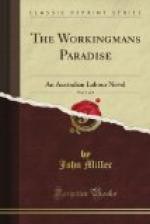The music stopped. With a start he came to himself, ashamed of his weakness, and hastily blew his nose, fussing pretentiously with his handkerchief. But only one had noticed him—Geisner, who seemed to see and hear everything. Connie was sobbing quietly with her arms round Harry’s neck, holding his head closely to her as he bent over her chair; all the while her foot beat time. Arty had suddenly grown moody again and sat with bent head, his cigar gone out in his listless hand. Ford had got up and was perched again on a corner of the table, smoking critically, apparently wholly engaged in watching the smoke wreaths he blew. George and Josie had taken each other’s hands and sat breathlessly side by side on the lounge. Nellie lay back in her chair, her face flushed, a twisted handkerchief stretched over her eyes by both hands.
“I think that’s the official version,” observed Geisner, running his fingers softly over the keys again.
“It’s above disputation, whatever it is,” remarked Ford.
“Why should it be, if all true music isn’t? And why should not this be the best rendering?”
He struck the grand melody again and it sounded softened, spiritualised, purified. Its fierce clamour, its triumphant crashing, were gone. It told of defeat and overthrow, of martyrs walking painfully to death, of prison cells and dungeons that never see the sun, of life-work unrewarded, of those who give their lives to Liberty and die before its shackled limbs are struck free. But it told, too, of an ideal held more sacred than life, rising ever from defeat, filling men’s hearts and brains and driving them still to raise again the flag of Freedom against hopeless odds. It was a death march rolling out, the death march of sad-souled patriots going sorrowfully to seal their faith with all their earthly hopes and human loves and to meet, calm and pale, all that Fate has in store. They said to Liberty: “In death we salute thee.” Without seeing her or knowing her, while the world around still slept in ignorance of her, they gave all up for her and in darkness died. Only they knew that there was no other way, that unless each man of himself dared to raise the chant and march forward alone, if need be, Liberty could never be.
“Well,” said Geisner, coming unconcernedly into the circle where they sat in dead silence. “Don’t you think the last rendering is the best, and isn’t it the best simply because it expresses the composer’s idea in the particular phase that we feel most at this present time?”




